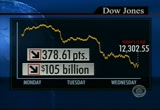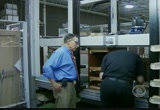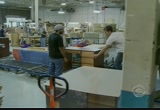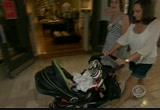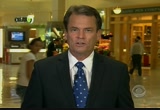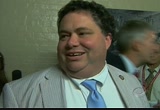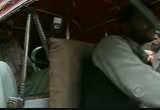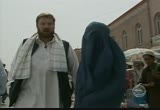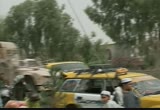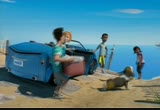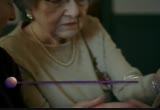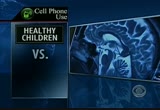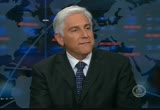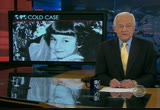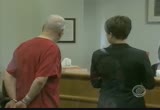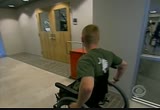tv CBS Evening News With Scott Pelley CBS July 27, 2011 5:30pm-6:00pm PDT
5:30 pm
>> schieffer: tonight, is it too late to save america's credit rating? even if the government does not default, america's bond rating may still be downgraded, which could stop the recovery in its tracks. mandy clark in kandahar, afghanistan's most dangerous city. she comes under attack while wearing a berka. >> reporter: another stone was just thrown at me-- ow! >> just today the city's mayor was assassinated in a brazen attack. cell phone safety: to all those minutes add up to health problems for kids? dr. jon lapook reports. and it's a place where wounded warriors learn to hope again. david martin on the closing of walter reed. captioning sponsored by cbs this is the "cbs evening news" with scott pelley.
5:31 pm
>> schieffer: good evening, scott's off tonight. i'm bob schieffer. the fallout from washington's inability to find a solution to the budget crisis and raise the debt limit has, apparently, begun. on wall street, the stock market was down for the third day in a row. the dow fell more than 198 point today. for the week, it's down nearly 400 points, and it has lost close to $105 billion in value. some of the bond rating services are now saying that even if congress does reach an agreement on a budget plan, it may be too late to avoid lowering the rating on some american securities. we have three reports tonight on that and what it means for small business and your credit card. and we start with anthony mason. anthony. >> reporter: bob, america's credit rating has never fallen below triple "a," but with
5:32 pm
washington looking increasingly dysfunctional, economists now see the threat of a downgrade as high and rising. >> do you honestly believe that the united states could default on its debt? >> reporter: in washington today, the head of standard & poors, told congress his rating agency is worried about more than just raising the debt ceiling. >> to me the more important issue is really the long-term growth rate of the debt. >> reporter: now at more than $14 trillion and rising, u.s. debt as a percentage of g.d.p. ranks fifth highest in the world. even if a deal emerges to raise the debt ceiling, it may not be enough for the ratings agencies. is there still a risk the u.s. credit may get downgraded anyway? >> well, it looks like that. >> reporter: but larry kantor, chief of research at barclay's capital, believes the world will still want to invest in the u.s. >> even if they downgraded, people still believe the u.s. will pay its debts. >> reporter: but a cut in the credit rating could still have expensive consequences, says
5:33 pm
economist michael darded. >> the risk will be that a downgrade would push up interest rates. >> reporter: that could add as much as $100 billion to the nation's annual borrowing costs. it could also raise the cost of mortgages and other consumer loans. countries with triple "a" ratings, on average, play just below 3% to borrow. countries with double "a" ratings pay three quarters more. japan's rating was downgraded to double "a," but because of a stagnant economy it still pays a lower interest rate than the united states. >> but a debt downgrade certainly doesn't help things. i mean, at a minimum it throws an added element of uncertainty into the mix of an already uncertain time. >> reporter: the rating agencies say there is no specific timetable. the decision on whether to downgrade will depend on events. standard & poors has already stated there is at least a 50% chance the credit rating of the u.s. will be cut. bob. >> schieffer: anthony, what do
5:34 pm
you think the chances are that we may just slide into another recession here? >> reporter: i don't think a downgrade itself will cause a recession, bob. but if the government is forced to shut down because the debt ceiling isn't raised, i think we could end up back in a recession and very quickly. >> schieffer: all right, well, thank you, thank you, anthony. this uncertainty has left many small business people literally not knowing what to do. elaine quijano has more on that part of the story. >> reporter: at the modu furniture company outside boston. >> how are you guys doing today? >> reporter: owner bill weissman doesn't like what he's seeing down in washington. >> it's irritating to me that they would put the general american public at risk because they're fighting with one another. >> reporter: weissman's sales are actually up 25% but uncertainty about the direction of the economy has put his business plan on ice. >> our bankers ask us, what, are you guys going to do next year? give me some projections. and i sit here and i say...
5:35 pm
i don't know! i have no idea what's going to happen. >> reporter: and what you're seeing in washington? >> it doesn't help at all. >> reporter: weissman is holding back plans to fully staff his plant with permanent workers. more than half now are temps. >> i have conversations with people on my floor. they tell me how hard it is for them to pay the bills. we find it very hard to give the people the raises that they need and deserve when the economy is not functioning properly. and the road that we have chosen and are going down is going to be just more pain and suffering. >> reporter: and weissman is not alone. a recent survey of corporate financial managers found that half plan to take defensive actions if the government defaults, and, bob, those strategies involve hiring freezes, delays in buying new equipment, or building up cash reserves. >> schieffer: all right thanks, elaine. elaine quijano in boston tonight.
5:36 pm
what you don't hear much about in the congressional debate is that if there is no agreement on the debt limit and that forces up interest rates on u.s. financial securities, that will also force up the interest rates on your adjustable rate credit card. chip reid has that part of the story. >> reporter: at tyson's corner mall in northern virginia, cristina salamone says she tries to avoid using credit cards. >> i try not to even use a credit card because of the outrageous rates. >> reporter: especially now with new baby daniel, and the last thing she needs is higher interest rates. but that is exactly what will happen if congress fails to reach a deal to raise the debt limit, according to john ulzheimer of smartcredit.com. >> if the u.s. defaults on this debt, it's highly likely the consumer who has a credit card with a variable rate is going to see their interest rate go up between 1% and 5%.
5:37 pm
>> reporter: what does that mean in dollars? on a 10,000 dollar balance, it would cost more than $25,000 to pay off. but if the rate rises to 20% a new $10,000 balance would cost more than $45,000. for cristina salamone, that would be incentive to avoid the mall all together. >> i'm not going to use my credit card then. >> reporter: you're not going to use it any more at all? >> no, no. >> we're not going to shop. >> we're not going to shop! >> reporter: if there is a default and interest rates do go up, those higher interest rates would apply only to future purchases so, bob, the experts say that would be a good time to keep those adjustable rate credit cards in the wallet. >> schieffer: all right, chip, thank you very much. chip reid. at the capital today, more than of the same-old, same-old-- no breakthrough on causing the crisis that's caused all this. our nancy cordes is at the capitol tonight. and, nancy, they're telling me you believe that could actually change tomorrow? >> reporter: not tomorrow, bob, but eventually, if things go
5:38 pm
their way tomorrow, we might be able to say a way of resolving this ordeal, but it all hinges on speaker boehner's ability to convince enough members of his own party to vote for his plan to raise the debt ceiling. in two separate closed door meeting, speaker boehner told tea party republicans it was time to close ranks around his bill even though it doesn't cut spending as much as they'd like. using colorful language boehner urged his members to get in line behind him. congress man requested far among texas was among the converted. >> i've moved from leaning no to undecided to lean yes. >> reporter: what changed your mind? >> it's just a matter of what we've got to take what we can take from a democrat white house and a democrat senate. >> reporter: republican senator john mccain prodded freshmen republicans to drop demands, too. >> that is not fair to the american people to hold out and say, "we won't agree to raising the debt limit until we pass a balanced budget amendment to the constitution." it's unfair. it's bizarro. >> reporter: boehner can afford
5:39 pm
to lose only a couple dozen republicans if he wants to pass his bill and send it to the senate where democratic leader harry reid has his own bill waiting in the wings. if speaker boehner is able to get his bill passed in the house, is there a way that you could alter it in the senate to make it more palatable to both parties? >> don't worry. it will be altered if it gets over here. >> reporter: what angers democrats the most about boehner's bill is its short-term extension of the debt ceiling, just six or seven months, which would set up a repeat of this whole debate in december. >> let's throw into doubt whether or not the united states is going to go into default around christmas-- brilliant. >> reporter: the white house has threatened to veto the boehner bill but if it passes in the house tomorrow, it comes to the senate and the two sides can figure out some way to change that six-month extension a bit it just might be the pathway out of this huge mess, bob. >> schieffer: okay, nancy. "bizarro" now a part of the conversation. there was another brazen attack today in kandahar, the key city to the war effort in southern afghanistan.
5:40 pm
the city's mayor was assassinated by a suicide bomber who hit a bomb-- hid a bomb in his turbin. cbs news correspondent mandy clark interviewed the mayor when she was in kandahar and included him in a story about an american soldier who is playing an unusual role there. here's her report. >> reporter: jim crawford may not look like it, but he's a u.s. army major, part of a program called "afghan hands," designed to mentor government officials. >> hey, how's it going? >> how you been? >> good, good. >> reporter: to break down barriers he wears local clothing and a full beard, like most afghan men. when we visited kandahar earlier this month, crawford was anxious to introduce us to the city's mayor, ghulam haider hamidi. >> there are a lot of good afghans here working, and working very hard and risking their life. he's one of them. so the people here are really lucky to have him as mayor.
5:41 pm
>> reporter: that luck ran out today. a suicide bomber got into the same corridor as the city hall the mayor had guide us through. on that day he told us he was fatalistic about the dangers he faced. >> reporter: crawford's job means he often takes the same risks as the afghans he works with. while most u.s. soldiers travel around kandahar in heavily armored vehicles, crawford suggested we see the city from an auto-rickshaw. what's it like being a soldier who gets to right around in a rickshaw? >> it's a huge advantage. i'm able to understand a bit more than, you know, if you're driving around in an armored vehicle and so it's sort of like from inside looking outside. >> reporter: crawford is mindful of the danger. what are you on the lookout for? >> the biggest threat is assassination. >> reporter: but getting out on
5:42 pm
the streets is a big part of the job. we went on a walking tour of kandahar's markets. crawford advised i'd be safer wearing a berka. are you used to wearing local clothes? >> i am now. >> reporter: i certainly got a different view of life through a vail. but not the protection we had hoped for. the crowd started stoning us. another stone was just thrown at me. ow! >> hey! knock it off! >> reporter: have you got that before-- ow! we're still getting stones thrown us. >> no, that's the first time. >> reporter: it can be a painful process but working through cultural misunderstandings is part of the job. in this case, the crowd may have mistaken me for an afghan woman walking with foreign men. >> this is a segregated society. >> reporter: the afghan hands volunteers commit to six years in the program, including two year-long deployments in afghanistan. >> it's like nothing else i've ever done in my career. >> reporter: the idea is to
5:43 pm
create a core group of regional experts. there are roughly 400 serving in afghanistan and pakistan so far. do you see this as the future? >> i hope it is the future. i... i think this is something we probably should have did right after 9/11. >> reporter: crawford believes that small groups of u.s. soldiers like him will still be living with the afghan people long after the combat troops have pulled out. mandy clark, cbs news, kandahar. >> schieffer: norway's intelligence chief said today the man who's confessed to massacring 76 people last week acted alone, and tonight, we're getting our first view of the explosion in oslo. surveillance video from an electronics store shows the force of the blast. a new study may answer the question do cell phones put young people at risk of getting cancer? a cold case murder may be solved 53 years later. and presidents, generals, and privates have all been treated
5:44 pm
there. walter reed's proud history when the "cbs evening news" continues. is t oh, there's a prize, all right. [ male announcer ] inside every box of cheerios are those great-tasting little o's made from carefully selected oats that can help lower cholesterol. is it a superhero? kinda. ♪ summertime is now a happy time. when we can eat what we want and sleep soundly through the night. prevacid®24hr prevents the acid that causes frequent heartburn, all day, all night. vietnam, 1967. i got mine in iraq, 2003. u.s.a.a. auto insurance is often handed down from generation to generation, because it offers a superior level of protection and because u.s.a.a.'s commitment to serve the military, veterans, and their families
5:45 pm
is without equal. begin your legacy. get an auto insurance quote. u.s.a.a. we know what it means to serve. we look out for patients by offering care 1 on 1. we help them save money with generic prescriptions. we talk to them about prescription safety and -- help them save money. plus we discuss possible side effects and -- help them save money! we help them save money. get care 1 on 1 and talk savings, safety, and side effects when you transfer or fill a new ongoing prescription. i'm carla, and this is my cvs. and his, too. that's how it is with alzheimer's disease. she needs help from me. and her medication. the exelon patch -- it releases medication continuously for twenty-four hours. she uses one exelon patch daily for the treatment of mild to moderate alzheimer's symptoms. [ female announcer ] it cannot change the course of the disease. hospitalization and rarely death have been reported in patients
5:46 pm
who wore more than one patch at a time. the most common side effects of exelon patch are nausea, vomiting, and diarrhea. the likelihood and severity of these side effects may increase as the dose increases. patients may experience loss of appetite or weight. patients who weigh less than 110 pounds may experience more side effects. people at risk for stomach ulcers who take certain other medicines should talk to their doctor because serious stomach problems such as bleeding may worsen. people with certain heart conditions may experience slow heart rate. [ woman ] whenever i needed her, she was there for me. now i'm here for her. [ female announcer ] ask the doctor about your loved one trying the exelon patch. visit exelonpatch.com to learn more. >> schieffer: there are 300 million cell phones in america, almost as many phones as people, but there are still some concerns about their safety. well, a study of users under the age of 20 out today found no link between cell phone use and
5:47 pm
an increased risk of brain cancer. dr. jon lapook has more on that. >> reporter: with a generation of kids connected to each other through cell phones, doctors like keith black have concerns about safety. >> what we know is that the microwave radiation from cell phones will penetrate deeper into the child's brain and more of the radiation goes into the brain because the scalp is thinner, the skull is thinner. >> reporter: in today's study, researchers compared cell phone use in healthy children and 352 brain tumor patients between the ages of seven and 19. cell phone use did not significantly increase the risk of a brain tumor. this research comes just two months after the world health organization categorized cell phones as "possibly carcinogenic." 75% of teenagers now have a cell phone, up from 45% in 2004 so a clearer picture of safety will only come from long-term study. >> what we're really concerned
5:48 pm
about is the child who begins using the cell phone at seven or 12, when they become an adult after 20 or 30 years of using the cell phone, is their risk higher? that is not answered by this study. >> reporter: bob, long-term studies are currently being done. >> schieffer: but the thing, is the use of cell phones has skyrocketed just in recent years so how can we be sure of these results? >> reporter: that's exactly the point, all right. if it turns out it takes ten, 20, 30 years for the problems to develop we may be just too early in the game. the studies need to continue, especially with five billion cell phone subscriptions worldwide. for now though, this is good news. >> schieffer: so far, so good? >> reporter: so far, so good. >> schieffer: a little girl's murder made national headlines half a century ago. now the mystery may finally be solved. that is next. ,,,,,,
5:51 pm
that has haunted a chicago suburb for more than a half a century. a little girl found murdered, no one ever charged, until now. dean reynolds has our report. >> reporter: for 53 years, the grave of seven-year-old maria ridulph was undisturbed, her unsolved murder case as cold as the ground that held her coffin. but this morning, her remains were exhumed to see if modern science and d.n.a. can support the authorities' belief that they've cracked this case at last. >> this was the murder of a seven-year-old girl. we want to bring the best minds available to us to have them conduct a thorough examination
5:52 pm
of her remains. >> reporter: on that december evening back in 1957, maria's friend, cathy sigman, recalled being together outside when a man called johnny asked if they wanted to play. cathy went to get her mittens but when she returned, johnny and the little girl were gone. maria's body was found the following april. early this month, police in washington, acting on a tip from illinois, arrested and charged jack daniel mccullough, a 71- year-old former policeman from the seattle area with kidnapping and murder. back in 1957, his name was john tessier. he was maria's neighbor. when questioned by police then, he said he was on a train to chicago when she disappeared. but three years ago after he changed his name to mccullough, an old girlfriend produced an unused train ticket of his from the very same day. that sparked an intense focus on him and more. >> we've been fairly astonished at the recollection of some of the residents. >> reporter: and more than half
5:53 pm
5:56 pm
problems for the world famous race. next on cbs 5 how a soup ingredient could >> schieffer: they held a ceremony to retire the flags at walter reed army hospital in washington today. america's been taking its presidents and war wounded there for more than a century. walter reed's time is coming to an end. here's david martin. >> reporter: a window on the war is closing. i've always thought that if people could see this on television one hour a day, they'd have a lot better understanding of what's going on. >> they would know the sacrifices that a small number of american heros are making. i see it every day. i see it on a daily basis, and i dream about this at night. it's just that significant. >> reporter: so these are the exam rooms? colonel van coots is the last commander walter reed army medical center will ever have. a month from now, the hospital
5:57 pm
which has cared for american combat casualties since world war i, will close its doors for the last time. >> and at the end of that, we're going to play "taps," and that is the day that i'm going to cry. >> reporter: the patients will be transferred to bethesda naval medical center a short ambulance ride away where new medical facilities are being built. but walter reed is where air force captain benjamin seekell learned to hope again gee, i was in a wheelchair and bandaged up and you come into a place like this and see guys with the exact same injury as you, or worse, running on a treadmill, lifting weights, and it gives you a lot of hope. you think, wow, if they can do it, i can do it. i'm in the right place. >> one of our patients even said that walter reed is where magic is made, and for a lot of these guys this is magic. this is miraculous. >> reporter: how else to explain the case of lieutenant brian brennan who lost both legs and
5:58 pm
was in a coma unresponsive to his own mother. >> i see his beautiful blue eyes but he's staring right through me and he doesn't know who i am and he doesn't know i'm there. >> reporter: until david petraeus stood at his bedside and shouted out his unit's motto. >> all of a sudden, the lieutenant, his stumps are banging up and down on the sheets, his head is moving around, and very clearly responding to his unit's nickname. >> everybody in the facility was clapping and crying. the doctors who had been working on him and given us all that bad news came running down the hall, "we heard, we heard." >> reporter: a year later brennan walked on to a stage and delivered an address to a crowd of 2,000 people. call it magic, call it sheer will power, or call it the spirit of walter reed. david martin, cbs news. >> schieffer: that's the news. for scott and all of us at cbs news, i'm bob schieffer. thank you, good night.
5:59 pm
captioning sponsored by cbs could spell trouble for the world-famous race. "...he's a re taking wind out of america's cup sails? why a popular soup ingredient could spell troubled for the world famous race. friends call him brother john. what a good samaritan was doing when he got shot. how a game show host was injured chasing down a barry bonds burglar. good evening, i'm allen martin. >> i'm dana king. >> an underwater invader is creating waves for the next americas cup race. phil matier shows us something that goes in miso soup is junking up the
357 Views
IN COLLECTIONS
KPIX (CBS) Television Archive
Television Archive  Television Archive News Search Service
Television Archive News Search Service 
Uploaded by TV Archive on

 Live Music Archive
Live Music Archive Librivox Free Audio
Librivox Free Audio Metropolitan Museum
Metropolitan Museum Cleveland Museum of Art
Cleveland Museum of Art Internet Arcade
Internet Arcade Console Living Room
Console Living Room Books to Borrow
Books to Borrow Open Library
Open Library TV News
TV News Understanding 9/11
Understanding 9/11
